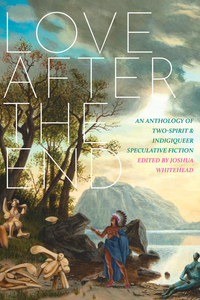“Tomorrow will be kinder,” I whisper as I am swept into the rushing river of my dreams.
—”The Ark of the Turtle’s Back” by jaye simpson
Love After the End: An Anthology of Two-Spirit and Indigiqueer Speculative Fiction, edited by Joshua Whitehead, is a follow up to the anthology Love Beyond Body, Space, and Time. These nine stories offer visions of the future that showcase hope and resilience in a ruined world.
Regarding the decision to focus on utopia rather than dystopia, Joshua Whitehead describes it as “…an important political shift in thinking about the temporalities of Two-Spirited, queer, trans, and non-binary Indigenous ways of being. For, as we know, we have already survived the apocalypse—this, right here, right now, is a dystopian present. What better way to imagine survivability than to think about how we may flourish into being joyously animated rather than merely alive?”
In these stories, topics often treated as theoretical in post-apocalyptic fiction are highlighted as realities of Indigenous people. For example, in “History of the New World,” Adam Garnet Jones shows a family being given the “opportunity” to move to another planet. As the protagonist is well aware, she is being asked to leave her ancestral home in order to colonize a planet that has been recently confirmed to have intelligent life—and does not trust her government’s plans for this “new” world and its inhabitants. Her wife, who is a white woman, brushes aside these concerns, insisting that leaving is the best thing for their young daughter. The fissure this creates in their family shows how even in the future, history cannot be ignored. Meanwhile, in “The Ark of the Turtle’s Back,” jaye simpson takes a different tack with the concept of humans moving to another planet, imagining a future in which a select group of people plan to form a healthy and mutual relationship with their new, uninhabited home.
Not every story grapples with the fate of humanity. In “Eloise” by David A. Robertson, virtual reality allows people to live out whole lifetimes in the span of a few minutes. A young woman who has been ghosted grapples with what another woman is willing to do rather than return her calls. I liked how this story showed that even in a future where technology creates so many grand opportunities for both good and ill, people are still dealing with something as personal as rejection.
As a fan of Darcie Little Badger’s writing, I also enjoyed “Story for a Bottle,” in which a girl is abducted under mysterious circumstances and writes a letter to her sibling. While she tries to escape, she uncovers the secrets of a floating city called New America. This story’s suspense and worldbuilding kept me intrigued through the end. Another story that I found intriguing both in its premise and how it is told is “Seed Children” by Mari Kurisato, which opens with its cyborg protagonist dramatically narrating her situation while bleeding out.
Overall, the stories differ in style as well as apparent audience, with some leaning more YA and some more adult. Though readers may thus end up favoring some stories over others, this anthology has a particularly solid thematic through line that makes it feel like more than the sum of its parts. The protagonists’ worlds have been stolen from them, and they must seek out space to heal and start anew. These characters are searching for security, connection, and home. If any of this resonates with you, I recommend this anthology, which also contains the works of Nathan Adler, Gabriel Castilloux Calderón, Kai Minosh Pyle, and Nazbah Tom.
Though these content warnings aren’t comprehensive, be aware that this anthology contains themes of climate change, colonialism, violence including state violence, bigotry including anti-Indigenous racism, children in peril, and an allegory for conversion therapy.

